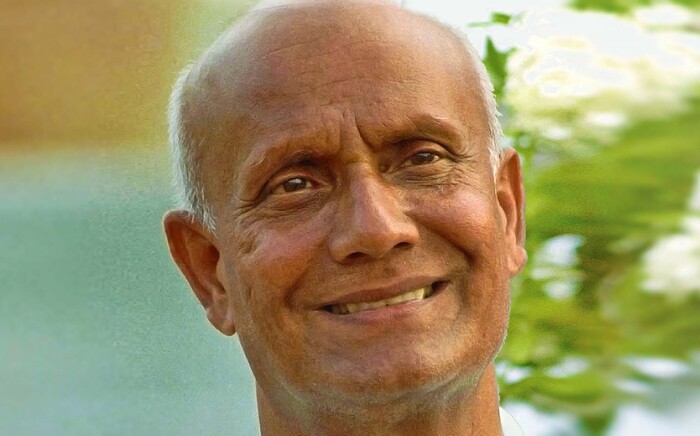The Irish Centre is performing tonight, both by ourselves and with the New Zealanders. We have the last substantial practices in the morning. The Irish one is I suppose typical of many last practices; bits and pieces come up that make you wonder whether we are actually ready to go on tonight. But something like this always happens; it'll be alright on the night..
In order to have a really soulful performance, it's important to be in a good frame of mind throughout the day. This turns out to require more than a little effort on my part; the lack of sleep and the heat is beginning to catch up on me and I'm a bit cranky. Fortunately, there's a lot of meditating to be done between now and this evening. First Sri Chinmoy invites Hiyamallar, a student of his from San Francisco up to sing Dyulok chariye nara narayan. Guru wrote this 56-stanza poem in 1945 when he was only 13; 50 years later he set the entire poem to music. At the time it was Sri Chinmoy's longest song, taking over 20 minutes to sing (It has since been superseded by The Ideal of Forgiveness, again also a musical rendition of Sri Chinmoy's childhood poetry, which takes 45 minutes). Hiyammalar has sung this song many times before and we never tire of listening to him. I was busy learning this song myself, using a recording of Hiyamallar's on my MP3 player, until the MP3 player decided to part company during a visit to Paris to see Sri Chinmoy 3 weeks ago. Hiyamallar sings with such love and soulfulness and listening to it definitely pushes back any black clouds that were threatening to appear on the horizon of my day.
Guru is always encouraging his students to take some form of exercise or another; he himself is certainly no armchair general in this regard. When his students began long-distance running 30 years ago, he himself took up running to inspire them and could regularly be seen out training hard in the small hours of the morning. Now in his seventies, he still takes exercise at least two hours a day. There are a row of exercise machines laid out on the court, all of which his students have built by hand, and many of which they came up with the idea for themselves - certainly some of them I have never seen anywhere else. Each of the machines gets put through their paces by Guru. Afterwards there is the award ceremony for the 12 hour walk in which the first seven men and women are honoured.
After the function ends, I nip back to the house for an hour's sleep (to relax the vocal chords, of course :) ) before heading back for another quick practice. There is no time anymore for any technical tweaks to the performance, all that matters is that we are in a meditative mood and feel our oneness with each other as much as possible - if we can perform as one voice it adds unimaginable strength to the music.
We thought we would be on just before New Zealand - it turns out we are actually on some time after. The first act of the evening is a play by Dipika from London. Dipika is a very accomplished theater director, having last year directed a performance of Sri Chinmoy's play Siddartha becomes the Buddha in London to great acclaim. This play is based on a collection of stories that Sri Chinmoy wrote about his experiences whilst running called Run and Become, Become and Run. When not directing, Dipika and her sister Shankara manage a series of running shops in England with the same name. The play is only able to dramatize a few of the many stories in the collection, but it still conveys the humour and oneness with humanity that are found in these writings and that anyone who goes out running in public can identify with. Afterwards Guru spoke about how happy he was with the play and how the shops are serving the running community in Great Britain.
Then the New Zealand performances are on, first New Zealand for two songs and then we are joined by Australia for the second two songs. There's a brief four or five minute respite until we go on with our own performance, time to just go into the heart. There's a few seconds spent arranging the microphones properly (in the performance we did last August, I might as well have been miming playing the flute because it wasn't miked.) Then we began. As I mentioned, the wind in the park impeded us from hearing each other during practices; now for the first time, I could actually hear all the other singing and instruments - it sounded so beautiful, I nearly wanted to just stop and listen. The flute came across quite well also, although I had to push it right up against the microphone. It really all just came together on the night.
Afterwards there was another very good play about Akhbar the Great, the most famous of the Moghul Emperors who ruled India in the 15th century. Akhbar was a Muslim, yet he did much to foster harmony between his Muslim and Hindu subjects. The play itself focused on the interplay between Akhbar and his chief minister Birbal, whose quick tongue got him into and out of many a tricky situation. The script, written by Mark from Canberra (who also played Birbal) was very tightly paced and funny, and Akbar himself was wonderfully played by Tejaswi.
At the meditation function's close I get a pleasant surprise - Mikael from Paris found my MP3 player and now he gives it back to me. Now I have no excuse to finish learning that song....
<< Sunday 16th Tuesday 18th >>






















